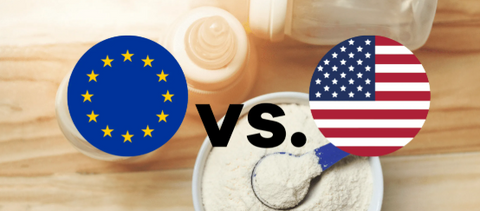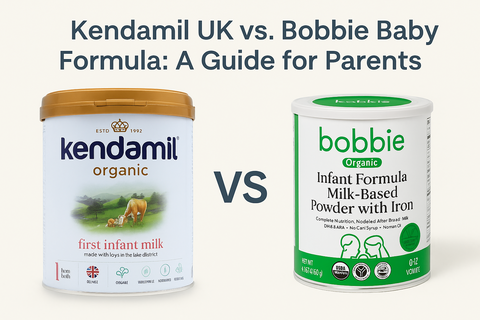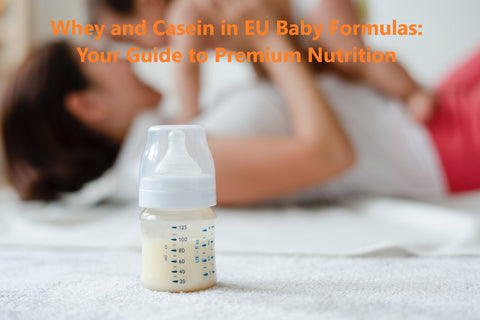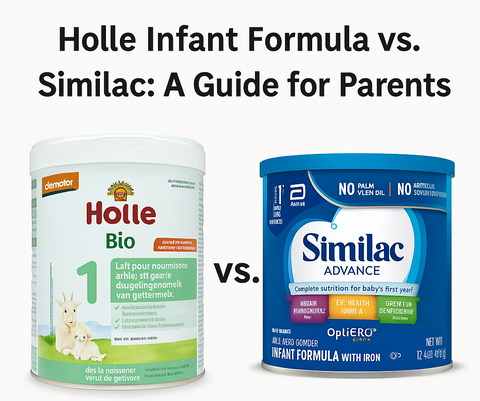Pros and Cons of Corn Maltodextrin in Baby Formula
Every aspect of your baby's nutrition matters, especially regarding carbohydrates. Carbohydrates, the primary source of energy and nourishment for your little one, hold significance in their early development. Among these, maltodextrin, derived from starch, is a carbohydrate component that provokes curiosity and discussion among parents. Understanding the role and impact of these nutrients on infant development is important. In this article, we delve deeper into maltodextrin, which is a carbohydrate source, its role in formulas, and the ongoing discussions surrounding its use. Maltodextrin might sound like a magical potion from a wizard's cauldron, but it's actually a product made from starch.
Background Info on Carbohydrates in Baby Formula

Understanding Carbohydrates
Carbohydrates play a pivotal role in fueling a baby's growth and development. Carbohydrates are essential for infants, constituting about 40-50% of the total calories in baby formula. At its essence, carbohydrates are chains of simple sugars, pivotal for immediate energy and rapid digestion. Combined as monosaccharides, these sugars serve as a vital energy source, fueling your baby's growth and activities.
Variety of Carbohydrates in Infant Formula
Here's an overview of the common carbohydrates found in infant formula:
- Lactose (Milk Sugar): This natural sugar is found in milk and is the primary carbohydrate in breast milk. It provides essential energy and aids in absorbing calcium and other nutrients.
- Fructose (Fruit Sugar): A naturally occurring sugar found in fruits. It's commonly used in formulas to enhance sweetness and flavor.
- Glucose (Starch Sugar): Glucose is a simple sugar obtained from starches. It's a quick source of energy for infants.
- Sucrose (Cane Sugar): A sugar commonly derived from sugarcane or sugar beets. It's used in some formulas to add sweetness.
- Starch (Plant-Based Complex Carb): This complex carbohydrate comprises many bonded sugar molecules. It's slowly digested, providing sustained energy over time.
- Maltodextrin (Plant-Based Processed Carb): Maltodextrin is derived from starches like corn or rice and is created through processing. It's easily digestible and serves as a rapid energy source.
Decoding Maltodextrin in Baby Formula

What is Corn Maltodextrin?
Maltodextrin is a carbohydrate from starchy foods like corn, rice, or potatoes. It's created by breaking down these foods into smaller parts. It's often used in baby formulas as a thickener or filler, providing a quick energy source for babies as it dissolves quickly and helps give texture.
Is Maltodextrin a Starch?
Yes, maltodextrin is derived from starch (but there is more). While derived from starch sources like corn, wheat, or potato, Maltodextrin is not precisely a starch in its conventional form. During maltodextrin production, starch molecules undergo partial hydrolysis, breaking them down into shorter chains of glucose molecules. As a result, maltodextrin comprises shorter chains of glucose units than starch, contributing to its rapid digestibility and water solubility. In essence, while maltodextrin originates from starch, the hydrolysis process alters its molecular structure, distinguishing it from intact starch.
Maltodextrin vs. Corn Syrup
Maltodextrin and corn syrup are both derived from corn; however, they differ in composition and sweetness levels. Maltodextrin is a polysaccharide made from corn starch through hydrolysis, consisting of shorter chains of glucose molecules. It's less sweet and commonly used as a thickener or filler in food products. On the other hand, corn syrup is primarily glucose and sometimes contains higher amounts of fructose. It's sweeter than maltodextrin and is often used as a sweetening agent in various food items.
Natural or Artificial?
Maltodextrin is made from natural sources like corn, rice, or potato starch, which undergoes processing to create a powdered form. Although it originates from these natural ingredients, manufacturing involves modification, making it a processed or refined food additive.
Safety for Babies
Maltodextrin is considered safe for babies and is approved for infant consumption by regulatory authorities like the FDA and EFSA. However, individual sensitivities or allergies should always be considered, and consulting a pediatrician for specific advice is recommended.
Maltodextrin vs. Lactose
Maltodextrin and lactose are different types of carbohydrates used in baby formulas. Maltodextrin, derived from starch, offers quick energy, while lactose in breast milk supports healthy infant growth and digestion. Both serve as sources of carbohydrates but have distinct properties and roles in baby nutrition.
The Pros and Cons of Maltodextrin
You've probably noticed that people are often weary of carbs. After all, why are those low-carb diets still popular? But carbohydrates aren't always bad, especially when it comes to babies, and maltodextrin can be an excellent example of that. Let's look at some of the benefits of maltodextrin when added to infant formula.
Pros:
- Rapid digestion, providing quick energy for infants: Recognized for its contribution to infant growth, maltodextrin is a valuable energy source, aiding your baby's development. Furthermore, the body swiftly absorbs corn maltodextrin, providing prompt utilization and energy for your baby.
- Contributes to a smooth consistency in the formula: Maltodextrin lends a silky consistency to the prepared formula, making it more palatable and easier for your baby to consume.
- Acts as an alternative carbohydrate source for babies with lactose intolerance: Maltodextrin is an excellent alternative energy source for babies requiring lactose-free or reduced-lactose formulas.
- Prolonging Formula Shelf Life: As a preservative, maltodextrin helps prolong the shelf life of your baby's formula, reducing the frequency of store runs and ensuring a consistent supply, particularly during emergencies.
- Maltodextrin is gluten-free
Cons:
Just like almost any other ingredient, maltodextrin also has some downsides. Although approved by the European Food and Safety Authority (EFSA) and the FDA, a meal containing maltodextrin can potentially cause side effects. Let's take a look at some of the possible drawbacks below.
- Allergies and Sensitivities: Maltodextrin consumption might pose potential concerns for newborns with food sensitivities or inflammatory bowel disease. Possible symptoms of maltodextrin allergy may include bloating, gas, cramps, diarrhea, and skin irritation.
- Increased Blood Sugar Levels: It's important to note that maltodextrin has a higher glycemic index than certain other carbohydrates, resulting in a similar impact on blood sugar levels as glucose.
- Processing methods raise artificiality concerns.
- Influence on taste and texture in formulas
Consult your pediatrician if you suspect your baby is experiencing intolerance to maltodextrin.
Choosing the Right Baby Formula: Considering Corn Maltodextrin
Choosing the right formula can become a time-consuming and challenging task to research and test what will work well for your baby. Maltodextrin has mixed reviews; some babies do very well on it, and others are more sensitive to this ingredient.
The best thing you can do is get expert recommendations from your pediatrician. They can help you understand your baby's needs and whether your little one has any food sensitivities. A professional can also help you compare formula options and learn more about their ingredients.
If you're looking for a wide assortment of premium baby formulas, you can find a wide range of options in our store and receive assistance from our attentive customer service team should you need a helping hand!


Find our complete baby formula comparison chart here.
Baby Formulas Without Maltodextrin
If you are looking for a baby formula that does not contain corn syrup or other non-lactose carbohydrates, you may want to consider European formulas or organic formulas. European formula is regulated differently than American formula and has stricter standards for using additives and other ingredients. Many European formulas use lactose as the primary carbohydrate source and do not contain any other added sugars, including corn syrup. This is because the European Food and Safety Authority (EFSA) makes evidence-based recommendations for infant formula stating that the preferred carbohydrate source in the formula should be lactose at levels of at least 4.5 grams per 100 calories, even in hydrolyzed formulas. The only exceptions are those formulas labeled as "lactose-free.
Maltodextrin-free formulas we carry are HiPP Dutch, HiPP UK, HiPP German (PRE is lactose only), Holle PRE, Lebenswert, Holle Goat PRE, HiPP HA, and HiPP Anti Reflux.
Conclusion
navigating the world of baby nutrition can sometimes feel like decoding a secret recipe book. In the debate over maltodextrin in baby formulas, it's important to weigh the different factors carefully. While maltodextrin offers a quick energy source and is considered safe for infants by regulatory bodies like the FDA (US) and EFSA (EU), its processed nature should be considered. Using maltodextrin in some formulas, especially for babies with lactose sensitivities, can be beneficial. Still, it’s equally crucial for parents to remain cautious about the overall composition of the formula.
Every baby is unique, with individual dietary needs and potential sensitivities. It's advisable for parents to consult pediatricians or healthcare professionals before selecting a formula, especially if considering options containing maltodextrin. Keep in mind that there are several high-quality European formulas from HiPP and Holle, both with and without maltodextrin, available at Organic Formula Shop, providing catering to diverse nutritional requirements.
In conclusion, while including maltodextrin in baby formulas may present benefits for certain infants, parental discretion guided by comprehensive research, professional advice, and consideration of the formula's ingredients remains paramount in ensuring the best choice for a baby's nutritional needs. Always prioritize your baby's health and well-being by making informed decisions and consult your parental master chefs (a.k.a. pediatricians) to cook the best formula for your tiny sous-chef!
Frequently Asked Questions
-
Does Maltodextrin contain gluten?
Gluten presence depends on the source; corn or rice-based maltodextrin is generally gluten-free. -
Why is Maltodextrin used in baby formulas?
It is added for energy provision, mimicking breast milk's carbohydrate content. -
What is Maltodextrin?
Maltodextrin, derived from starches like corn, rice, or potato, comprises easily digestible glucose chains, providing quick energy. -
Is Maltodextrin safe for babies?
Widely regarded as safe and approved by regulatory bodies for infant consumption.
Disclaimer
This article isn't medical advice. Always consult your pediatrician before altering your child’s diet or if you notice any changes.




